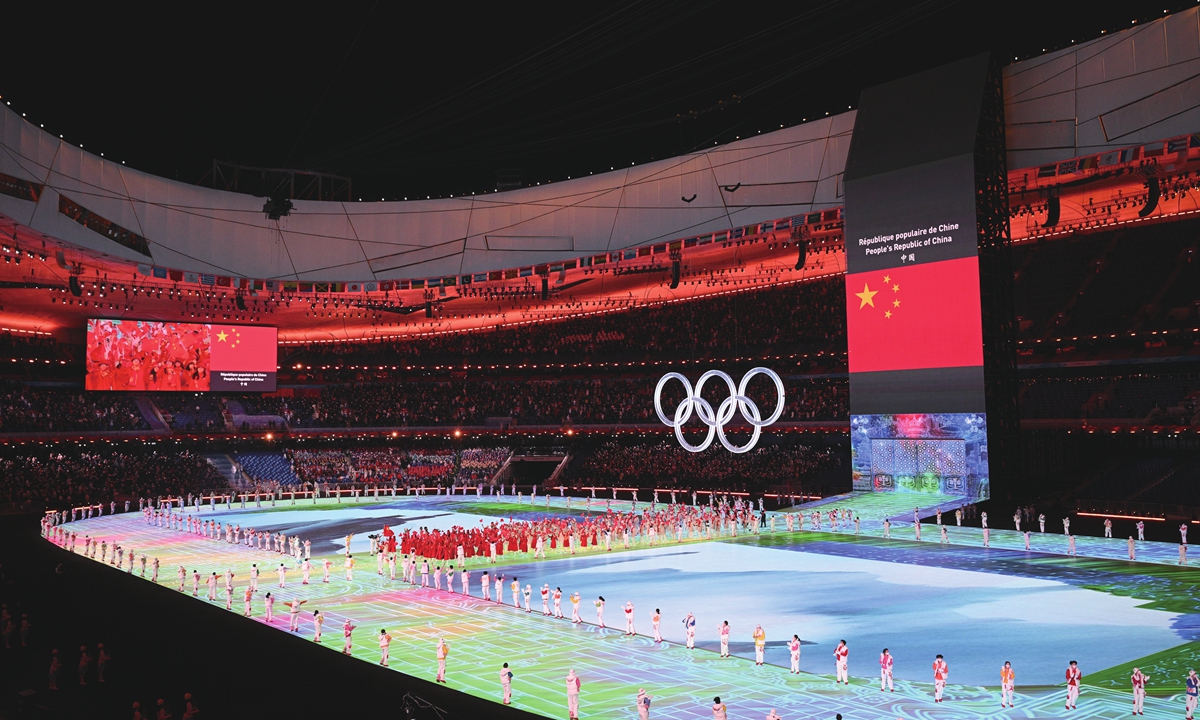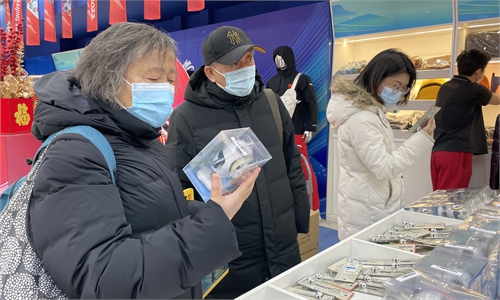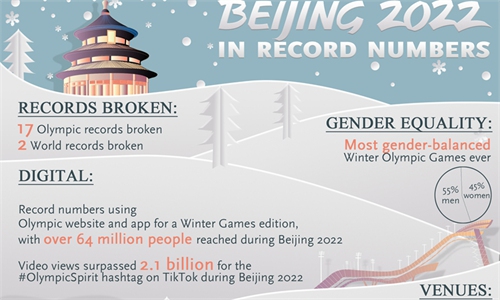Cynics seeking validation left disappointed as Beijing 2022 concludes successfully

Members of Team China wave during the opening ceremony of the Beijing 2022 Winter Olympics at the Beijing National Stadium on February 04, 2022 in Beijing, China. Photo: VCG
Only a few months ago, some critics were casting doubt on the viability of the scheduled 2022 Winter Olympics in Beijing.
In the weeks and months preceding the Winter Games, there was a concerted effort in some Western countries and diplomatic circles to organize a "boycott." In the US, Nikki Haley, the former American envoy to the United Nations, joined a chorus of politicians calling for the US to "boycott the Games."
"We should absolutely boycott the Chinese Olympics. Other allies and friends should do it with us," Haley said in 2021.
Tom Cotton, a member of the US Senate, also called for a "complete and total boycott," which would have prevented American athletes from competing.
In the end, only 10 countries - the US, the UK, Canada, Australia, India, Lithuania, Kosovo, Belgium, Denmark & Estonia - declared a "diplomatic boycott," meaning they would not send any government ministers to attend, though their athletes still competed. The small number of non-participating governments could not contain the energy and dynamism of their athletes, nor that of the participants from throughout the world.
In fact, the 2022 Winter Games attracted nearly 3,000 athletes from 91 countries and regions, including representation from all six inhabited continents, and two countries, Saudi Arabia and Haiti, who were competing in the winter Olympics for the first time ever.
Of course, the Beijing Olympics were far from ordinary. Taking place under the threat of the ever-present coronavirus pandemic, extraordinary measures were taken by authorities to contain the spread of the virus and help ensure any potential infections did not make their way into the general population.
Despite significant logistical challenges, the Beijing Winter Olympics wrapped up on February 20 without a hitch, and the world's athletes, coaches and journalists have begun to return to their home countries.
In many ways, this year's competition was a facsimile of the hostile practices of how some governments, particularly in the West, have attempted to engage with China.
For many months, there was a campaign to organize "a total boycott" of the Olympics. When that failed, a mass "diplomatic boycott" was attempted. And soon enough, that fizzled too only a small handful of governments announcing they would not send ministers.
In some diplomatic circles, particularly in the West, efforts have been made in recent years to isolate China economically, to "de-couple" from it, and encourage other countries to do likewise. These efforts, similarly, are boycotts in everything but name, and they too have failed.
The common thread, both in the Olympics and in diplomacy, is that cooperation will always beat division.
The success of the 2022 Winter Olympic Games was a testament to the collaboration between thousands of athletes, coaches, trainers, and all their fans cheering them on at home. The voices of Sinophobic antagonism, who have failed to defeat China economically or diplomatically, have also failed to isolate it in the world of sports competitions.
Perhaps the most powerful microcosm of China's ascendancy in the world was represented in this year's medal count. Fifteen medals were won, including nine gold. During the last 2018 Winter Games in Pyeongchang, South Korea, China won nine medals, including just one gold.
But the overarching theme of the 2022 Olympics, and China in general, is not about the failure of the voices of division, or even about China's successes, but the power of cooperation between all nations. The choice facing Western governments, then, is whether they will choose the path of mutual success and empowerment, as embodied in the Olympics, or fruitless and self-defeating opposition.
It was no coincidence that the official slogan for the Beijing Olympics was "Together for a Shared Future," and according to organizers, it reflected "the power of the Games to overcome global challenges as a community." In an era of widespread polarization and division, the need for unity has never been greater, and now is the time for the Western world to show true sportsmanlike conduct and engage with China with openness, respect and truth.
The author writes about relations between China and the West. opinion@globaltimes.com.cn



